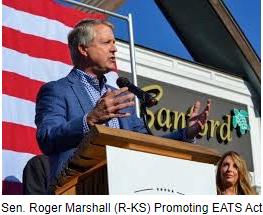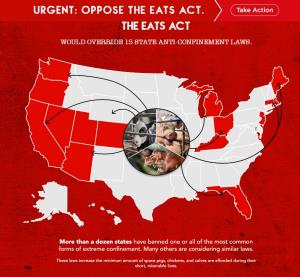A group of 171 legislators have addressed letters to the Speaker of the House and the Leader of the Senate expressing their opposition to including the proposed EATS Act in the 2023 Farm Bill. The purpose of the Ending Agricultural Trade Suppression Act (EATS) is to reverse the impact of the SCOTUS opinion that the interstate trade implications of California Proposition #12 are constitutional.

The action by the legislators effectively creates a solid obstacle for passage of the 2023 Farm Bill if the EATS Act is bundled into the package. There is in any event considerable dissention between and within parties and the Chambers on the scope of the 2023 Farm Bill. Conservatives are opposed to aspects of SNAP eligibility and food support for the needy that represents 75 percent of the allocation of funds under the 2023 Farm Bill. Even if changes to SNAP are passed by the House, there will be extensive and heated negotiation during reconciliation with the Senate version.
Republican Senators Chuck Grassley (R-IA) and Roger Marshall (R-KS) are promoting the EATS Act that basically will allow pork derived from sows held in gestation crates to be distributed nationwide. The reality is that major packers have already committed to group housing in response to customer demands reflecting acceptable welfare standards. Even if the EATS Act passes as free-standing legislation, it is inevitable that producers of pork using gestation crates will be deprived of domestic markets and will be subjected to negative price discrimination.
 It is ironic that elements of the pork industry are seeking federal legislation to perpetuate a specific housing system. In 2018, lobbying against the “Egg Bill” scuttled a federal standard for housing of hens that would at that time have recognized enriched colony modules as a replacement system for conventional cages.
It is ironic that elements of the pork industry are seeking federal legislation to perpetuate a specific housing system. In 2018, lobbying against the “Egg Bill” scuttled a federal standard for housing of hens that would at that time have recognized enriched colony modules as a replacement system for conventional cages.
Whether or not the EATS Act is incorporated in the 2023 Farm Bill or as separate legislation, it will have little impact on the egg industry. Currently one-third of all hens are housed in alternatives to conventional cages. Production from aviary and barn systems is adequate to meet the demand for cage-free eggs that in some markets have become a commodity.